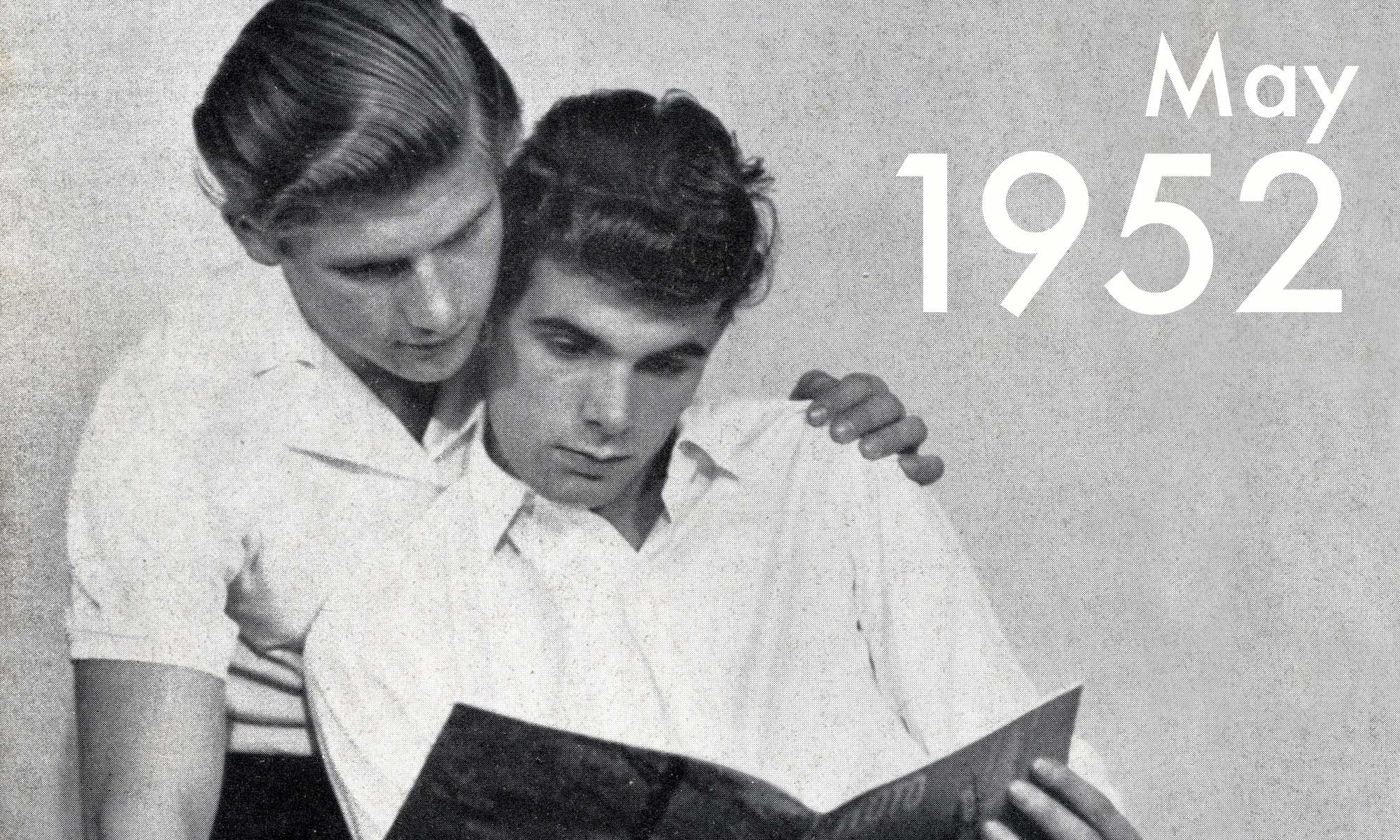| ◄ MAY ► | ||||||
|---|---|---|---|---|---|---|
| ◄ 1952 ► | ||||||
| 1 | 2 | 3 | ||||
| 4 | 5 | 6 | 7 | 8 | 9 | 10 |
| 11 | 12 | 13 | 14 | 15 | 16 | 17 |
| 18 | 19 | 20 | 21 | 22 | 23 | 24 |
| 25 | 26 | 27 | 28 | 29 | 30 | 31 |
| President: | Harry S Truman (D) | |||
| Vice-President: | Alben W. Barkley (D) | |||
| House: | 231 (D) | 200 (R) | 1 (Other) | 3 (Vacant) |
| Southern states: | 103 (D) | 2 (R) | ||
| Senate: | 50 (D) | 46 (R) | ||
| Southern states: | 22 (D) | |||
| GDP growth: | 2.2% | (Annual) | ||
| 0.7% | (Quarterly) | |||
| Inflation: | 1.9% | |||
| Unemployment: | 3.0% | |||
| US killed in action, | 303 | (This month) | ||
| Korean conflict: | 28,620 | (Since Jun 28, 1950) | ||
![]()
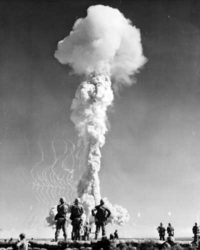 May 1: About 2,100 Marines perform atomic warfare maneuvers for the first time when a 19-kiloton bomb is detonated at the Nevada Nuclear Test Site. The marines shield themselves in fox holes as close as three miles from ground zero. Immediately after the explosion, the Marines emerge from their fox holes and, after a few more minutes, move forward in vehicles to ground zero.
May 1: About 2,100 Marines perform atomic warfare maneuvers for the first time when a 19-kiloton bomb is detonated at the Nevada Nuclear Test Site. The marines shield themselves in fox holes as close as three miles from ground zero. Immediately after the explosion, the Marines emerge from their fox holes and, after a few more minutes, move forward in vehicles to ground zero.
![]() May 2: The United Steelworkers call off its strike at President Truman’s request. But U.S. Steel, the nation’s largest steelmaker, says it will need a “reasonable assurance” that the strike won’t soon resume before it agrees to begin the arduous task of firing up its furnaces. Bethlehem and Republic, second- and third-ranked steel producers respectively, say that they will begin recalling workers after their blast furnaces are brought back up to full temperature. Many smaller steel producers also say they cannot resume production on a day-to-day basis due to the amount of time required to restart production.
May 2: The United Steelworkers call off its strike at President Truman’s request. But U.S. Steel, the nation’s largest steelmaker, says it will need a “reasonable assurance” that the strike won’t soon resume before it agrees to begin the arduous task of firing up its furnaces. Bethlehem and Republic, second- and third-ranked steel producers respectively, say that they will begin recalling workers after their blast furnaces are brought back up to full temperature. Many smaller steel producers also say they cannot resume production on a day-to-day basis due to the amount of time required to restart production.
![]()
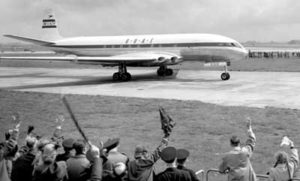 May 2-3: The first commercial jet flight in history occurs when a British Overseas Airways Corporation de Havilland Comet leaves London Airport for Johannesburg. The flight shaves eight hours off of the thirty-two hours — which includes five stops for refueling — that is normally required for a propeller-driven airline. The thirty-six passengers paid either $490 (about $4,700 today) for a one-way ticket or $882 (about $9,000 today) round trip.
May 2-3: The first commercial jet flight in history occurs when a British Overseas Airways Corporation de Havilland Comet leaves London Airport for Johannesburg. The flight shaves eight hours off of the thirty-two hours — which includes five stops for refueling — that is normally required for a propeller-driven airline. The thirty-six passengers paid either $490 (about $4,700 today) for a one-way ticket or $882 (about $9,000 today) round trip.
![]() May 3: The U.S. Supreme Court agrees to review President Truman’s seizure of the nation’s steel mills on May 12. The Court also bars the government from raising steelworkers’ wages. With a clear path set for the next two weeks, U.S. Steel and other companies agree to re-start production. But with the court blocking Truman’s threat to arbitrarily impose new wage structures if the union and companies can’t agree on a larger contract, the White House-sponsored steel talks will collapse the next day.
May 3: The U.S. Supreme Court agrees to review President Truman’s seizure of the nation’s steel mills on May 12. The Court also bars the government from raising steelworkers’ wages. With a clear path set for the next two weeks, U.S. Steel and other companies agree to re-start production. But with the court blocking Truman’s threat to arbitrarily impose new wage structures if the union and companies can’t agree on a larger contract, the White House-sponsored steel talks will collapse the next day.
![]() May 3: The government orders a 30% cut in the use of aviation gasoline due to a national strike by oil workers. The Air Force has already curtailed flight operations outside of Korea because of the limited supplies. Oil production is down about 35% because of the strike. Spot gasoline shortages are starting to appear. About half of Detroit’s 3,000 gas stations are either dry or has begun to ration their sales for the first time since World War II.
May 3: The government orders a 30% cut in the use of aviation gasoline due to a national strike by oil workers. The Air Force has already curtailed flight operations outside of Korea because of the limited supplies. Oil production is down about 35% because of the strike. Spot gasoline shortages are starting to appear. About half of Detroit’s 3,000 gas stations are either dry or has begun to ration their sales for the first time since World War II.
![]() May 5: Gen. J. Lawton Collins, Army Chief of Staff tells a Senate Appropriations Subcommittee that important types of ammunition “have been rationed in Korea” due to House-imposed cuts in military spending and other difficulties in ramping up defense production.
May 5: Gen. J. Lawton Collins, Army Chief of Staff tells a Senate Appropriations Subcommittee that important types of ammunition “have been rationed in Korea” due to House-imposed cuts in military spending and other difficulties in ramping up defense production.
![]() May 7: Gen. Matthew Ridgway, Commander of U.N. forces in Korea, says that his most recent truce proposal is his final offer. Truce negotiations have bogged down over the Communists’ insistence that all prisoners of war be returned regardless of whether they want to go back home or not. The U.N. says that thousands of North Korean soldiers that being held by the U.N. are South Koreans who were pressed into the North Korean army and do not wish to be repatriated to the North. As many as 100,000 U.N.-held prisoners say they don’t want to return. The U.N. has, in its latest proposal, offered to allow the North to question the POWs to verify their wishes.
May 7: Gen. Matthew Ridgway, Commander of U.N. forces in Korea, says that his most recent truce proposal is his final offer. Truce negotiations have bogged down over the Communists’ insistence that all prisoners of war be returned regardless of whether they want to go back home or not. The U.N. says that thousands of North Korean soldiers that being held by the U.N. are South Koreans who were pressed into the North Korean army and do not wish to be repatriated to the North. As many as 100,000 U.N.-held prisoners say they don’t want to return. The U.N. has, in its latest proposal, offered to allow the North to question the POWs to verify their wishes.
![]()
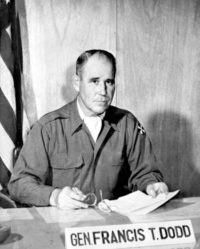 May 7: Hardline Communist North Korean prisoners of war at the U.N. camp on Koje Island seize Brig. Gen. Francis T. Dodd and another officer during a meeting with prisoners at a camp gate. Hardline Communist prisoners have already instigated two riots this year there, resulting in 80 North Korean prisoners killed and 166 wounded. Since those riots,, the allies have been screening prisoners and removing those who do not want to be repatriated back to North Korea. Those prisoners have been sent to other camps for their own safety. This has left only the most hard-core Communist POWs at Koje. The prisoners demand phone lines to all other POW compounds on Koje, presumably to coordinate further uprisings or reprisals. The U.N. immediately announce that Dodd has been relieved of his command at Koje and “will speak only as an individual U.N. soldier.” Brig. Gen. Charles Colson is named the camp’s new commander.
May 7: Hardline Communist North Korean prisoners of war at the U.N. camp on Koje Island seize Brig. Gen. Francis T. Dodd and another officer during a meeting with prisoners at a camp gate. Hardline Communist prisoners have already instigated two riots this year there, resulting in 80 North Korean prisoners killed and 166 wounded. Since those riots,, the allies have been screening prisoners and removing those who do not want to be repatriated back to North Korea. Those prisoners have been sent to other camps for their own safety. This has left only the most hard-core Communist POWs at Koje. The prisoners demand phone lines to all other POW compounds on Koje, presumably to coordinate further uprisings or reprisals. The U.N. immediately announce that Dodd has been relieved of his command at Koje and “will speak only as an individual U.N. soldier.” Brig. Gen. Charles Colson is named the camp’s new commander.
![]()
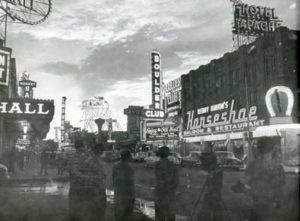 May 7: Las Vegas tourists drag themselves out of the city’s hotels and casinos at five in the morning to witness a 12-kiloton nuclear detonation at the Nevada Nuclear Test Site 75 miles away. The detonation takes place about a half-hour before sunrise, making it visible as a brief flash as far away as Los Angeles. Police Chief O.Z. Bennet of St. George, Utah, says that the explosion “wasn’t as loud to us here as others before, but there was quite a rumble.”
May 7: Las Vegas tourists drag themselves out of the city’s hotels and casinos at five in the morning to witness a 12-kiloton nuclear detonation at the Nevada Nuclear Test Site 75 miles away. The detonation takes place about a half-hour before sunrise, making it visible as a brief flash as far away as Los Angeles. Police Chief O.Z. Bennet of St. George, Utah, says that the explosion “wasn’t as loud to us here as others before, but there was quite a rumble.”
![]() May 8: Secretary of the Army Frank Pace, Jr., reveals that the Army’s newly developed Atomic Gun will deliver “immeasurably greater power than any artillery hitherto known.” According to Pace, it is “carried on a platform suspended between two engine cabs at front and rear” and “can travel at a speed of about 35 miles an hour on highways. … It can travel cross-country, fit into a landing ship designed for amphibious operations. It can fire with accuracy comparable to conventional artillery and tests indicate it is much more accurate at long range.” Pace says that the Army is also developing guided missiles and rockets with atomic warheads.
May 8: Secretary of the Army Frank Pace, Jr., reveals that the Army’s newly developed Atomic Gun will deliver “immeasurably greater power than any artillery hitherto known.” According to Pace, it is “carried on a platform suspended between two engine cabs at front and rear” and “can travel at a speed of about 35 miles an hour on highways. … It can travel cross-country, fit into a landing ship designed for amphibious operations. It can fire with accuracy comparable to conventional artillery and tests indicate it is much more accurate at long range.” Pace says that the Army is also developing guided missiles and rockets with atomic warheads.
![]() May 10: North Korean prisoners of war on Koje Island release Brig. Gen. Francis T. Dodd, the camp’s former commander, after four days in captivity. The Army doesn’t disclose what concessions it made to obtain Dodd’s release. But over the next several days, it will emerge that acting camp commander Brig. Gen. Charles Colson promised that there would be no more “forcible screening” of prisoners to determine which wanted to refuse repatriation back to the North. The promise represents a propaganda coup for the North since there had never been any “forcible screenings.”
May 10: North Korean prisoners of war on Koje Island release Brig. Gen. Francis T. Dodd, the camp’s former commander, after four days in captivity. The Army doesn’t disclose what concessions it made to obtain Dodd’s release. But over the next several days, it will emerge that acting camp commander Brig. Gen. Charles Colson promised that there would be no more “forcible screening” of prisoners to determine which wanted to refuse repatriation back to the North. The promise represents a propaganda coup for the North since there had never been any “forcible screenings.”
![]() May 11: As the nation’s strike by oil workers begins its twelfth day, The U.S. and Britain joined in a worldwide appeal to restrict consumption of aviation fuel. Britain imports most of its high octane fuel from the U.S.
May 11: As the nation’s strike by oil workers begins its twelfth day, The U.S. and Britain joined in a worldwide appeal to restrict consumption of aviation fuel. Britain imports most of its high octane fuel from the U.S.
![]()
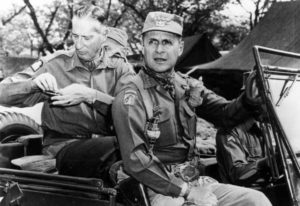 May 12: Gen. Matthew Ridgway, supreme commander of U.N. forces in Korea, officially turns over his Far Eastern command to Gen. Mark W. Clark. Ridgway departs for Paris, where he will succeed Gen. Dwight D. Eisenhower as Supreme Allied Commander for Europe. Before Ridgway leaves his headquarters in Tokyo, he angrily blasts Communist truce delegates as liars, and warn that negotiations face complete collapse unless they accept the United Nation’s final terms.
May 12: Gen. Matthew Ridgway, supreme commander of U.N. forces in Korea, officially turns over his Far Eastern command to Gen. Mark W. Clark. Ridgway departs for Paris, where he will succeed Gen. Dwight D. Eisenhower as Supreme Allied Commander for Europe. Before Ridgway leaves his headquarters in Tokyo, he angrily blasts Communist truce delegates as liars, and warn that negotiations face complete collapse unless they accept the United Nation’s final terms.
![]()
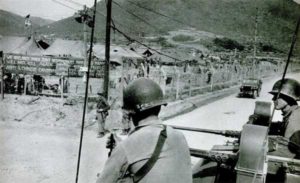 May 12: Gen. Mark Clark, the new supreme commander of U.N. forces in Korea angrily denounces the agreement made between Brig. Gen. Charles Colson and North Korean POWs that had seized Koje Island camp commander Brig. Gen. Francis T. Dodd and held him captive. Colson agreed to the prisoners’ demand that the U.N. cease “barbarous behavior, insult, torture, forcible protest with blood writing … mass murder … using poison gas … germ weapons … experiment object of A-bombs.” Colson also signed a statement saying, “I do admit that there have been instances of bloodshed where many prisoners of war have been killed and wounded by U.N. forces. I can assure you that in the future the prisoners of war can expect humane treatment.”Gen. Clark says that all such allegations are completely without foundation. “The reply by Gen. Colson to the Communist prisoners was made under great duress,” says Clark.”The Communist demands were unadulterated blackmail and any commitments made by Gen. Colson should be interpreted accordingly.” Colson will be fired the next day as commander of Koje Island for handing the North such a devastating propaganda coup.
May 12: Gen. Mark Clark, the new supreme commander of U.N. forces in Korea angrily denounces the agreement made between Brig. Gen. Charles Colson and North Korean POWs that had seized Koje Island camp commander Brig. Gen. Francis T. Dodd and held him captive. Colson agreed to the prisoners’ demand that the U.N. cease “barbarous behavior, insult, torture, forcible protest with blood writing … mass murder … using poison gas … germ weapons … experiment object of A-bombs.” Colson also signed a statement saying, “I do admit that there have been instances of bloodshed where many prisoners of war have been killed and wounded by U.N. forces. I can assure you that in the future the prisoners of war can expect humane treatment.”Gen. Clark says that all such allegations are completely without foundation. “The reply by Gen. Colson to the Communist prisoners was made under great duress,” says Clark.”The Communist demands were unadulterated blackmail and any commitments made by Gen. Colson should be interpreted accordingly.” Colson will be fired the next day as commander of Koje Island for handing the North such a devastating propaganda coup.
![]()
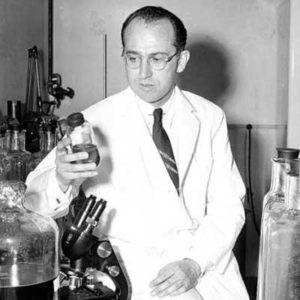 May 12: Dr. Jonas Salk, director of the Virus Research Laboratory at the University of Pittsburgh, reveals that a polio vaccine will be tested “soon” on human beings. Tests on monkeys reveal that immunity to all types of polio follow vaccination by about three weeks.
May 12: Dr. Jonas Salk, director of the Virus Research Laboratory at the University of Pittsburgh, reveals that a polio vaccine will be tested “soon” on human beings. Tests on monkeys reveal that immunity to all types of polio follow vaccination by about three weeks.
![]() May 12-13: The U.S. Supreme Court hears arguments on President Truman’s nationalization of the steel industry. The Truman Justice Department says that the President has the power to act based on unspecified emergency Constitutional powers. A majority of justices appear skeptical of the President’s power to seize property without authorization from Congress. When Acting Attorney General Philip B. Periman argues that the President’s seizure is justified because “we are at war,” two justice point out that the President specifically has not called the Korean conflict a war, but a police action.
May 12-13: The U.S. Supreme Court hears arguments on President Truman’s nationalization of the steel industry. The Truman Justice Department says that the President has the power to act based on unspecified emergency Constitutional powers. A majority of justices appear skeptical of the President’s power to seize property without authorization from Congress. When Acting Attorney General Philip B. Periman argues that the President’s seizure is justified because “we are at war,” two justice point out that the President specifically has not called the Korean conflict a war, but a police action.
![]()
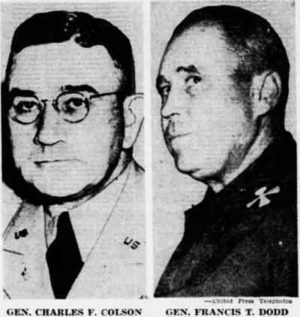 May 14: The UPI reports that Gen. Mark Clark, supreme commander of the U.N. forces in Korea, has “told off” Gens. Charles F. Colson and Francis T. Dodd for their debacle in dealing with North Korean POWs who had captured Dodd and held him for four days. The standoff only ended when Colson, who replaced Dodd as camp commander soon after Dodd’s capture, agreed to a set of POW demands that amounted to a major propaganda coup for North Korea. Clark is reported to be furious that the two Generals had acceded to the POW’s demands that the U.N. cease “barbarous behavior, insult, torture, forcible protest with blood writing … mass murder … using poison gas … germ weapons … experiment object of A-bombs.” By agreeing to the demands, the North is now claiming that Clark “openly admitted” that Communist POWs are being subjected to inhumane treatment. Clark is also furious that Dodd placed himself into a situation where he could be captured by his own prisoners to begin with.
May 14: The UPI reports that Gen. Mark Clark, supreme commander of the U.N. forces in Korea, has “told off” Gens. Charles F. Colson and Francis T. Dodd for their debacle in dealing with North Korean POWs who had captured Dodd and held him for four days. The standoff only ended when Colson, who replaced Dodd as camp commander soon after Dodd’s capture, agreed to a set of POW demands that amounted to a major propaganda coup for North Korea. Clark is reported to be furious that the two Generals had acceded to the POW’s demands that the U.N. cease “barbarous behavior, insult, torture, forcible protest with blood writing … mass murder … using poison gas … germ weapons … experiment object of A-bombs.” By agreeing to the demands, the North is now claiming that Clark “openly admitted” that Communist POWs are being subjected to inhumane treatment. Clark is also furious that Dodd placed himself into a situation where he could be captured by his own prisoners to begin with.
![]() May 16: The nationwide strike by oil workers begins to slowly wind down as local agreements are being reached to allow about a fifth of 90,000 striking oil workers to return to their jobs.
May 16: The nationwide strike by oil workers begins to slowly wind down as local agreements are being reached to allow about a fifth of 90,000 striking oil workers to return to their jobs.
![]()
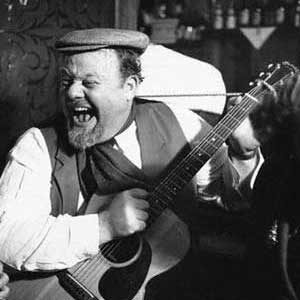 May 20: Folk Singer Burl Ives testifies before the Senate Internal Security Subcommittee, which is chaired by Joseph McCarthy ally Pat McCarran (D-NV). Ives volunteers to testify in a closed session in an attempt to clear his name after it appeared in Red Channels, an unofficial blacklist of entertainers published in 1950. While Ives has been closely associated with leftist causes, he denies ever being a member of the Communist Party. But he does name four others, including his former manager, who were present at Communist Political Association meetings he attended in 1944. Ives’s testimony ends his blacklisting, but it earns him the enmity of folk music fans and fellow musicians. Irwin Silber, founder and editor of Sing Out! magazine, accuses Ives of singing a new song, “Ballad for Stoolpigeons.” Ives’s old friend Pete Seeger accuses Ives of betraying the cause of cultural and political freedom to save his career.
May 20: Folk Singer Burl Ives testifies before the Senate Internal Security Subcommittee, which is chaired by Joseph McCarthy ally Pat McCarran (D-NV). Ives volunteers to testify in a closed session in an attempt to clear his name after it appeared in Red Channels, an unofficial blacklist of entertainers published in 1950. While Ives has been closely associated with leftist causes, he denies ever being a member of the Communist Party. But he does name four others, including his former manager, who were present at Communist Political Association meetings he attended in 1944. Ives’s testimony ends his blacklisting, but it earns him the enmity of folk music fans and fellow musicians. Irwin Silber, founder and editor of Sing Out! magazine, accuses Ives of singing a new song, “Ballad for Stoolpigeons.” Ives’s old friend Pete Seeger accuses Ives of betraying the cause of cultural and political freedom to save his career.
![]()
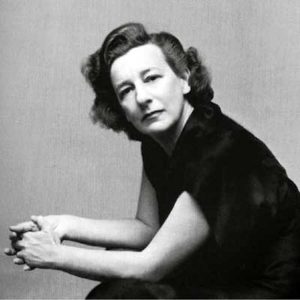 May 21: Playwright Lillian Hellman (The Children’s Hour, The Little Foxes, Watch on the Rhine) testifies before the House Un-American Activities Committee. Before her appearance, she sent a letter to all of the committee members saying she is willing to speak about herself, but she will not talk about anyone else. She writes: “[T]here is one principle that I do understand. I am not willing, now or in the future, to bring bad trouble to people who, in my past association with them, were completely innocent of any talk or any action that was disloyal or subversive. … [T]o hurt innocent people whom I knew many years ago in order to save myself is, to me, inhuman and indecent and dishonorable. I cannot and will not cut my conscience to fit this year’s fashions… I was raised in an old-fashioned American tradition and there were certain homely things that were taught to me: to try to tell the truth, not to bear false witness, not to harm my neighbour, to be loyal to my country, and so on. In general, I respected these ideals of Christian honor and did as well as I knew how. It is my belief that you will agree with these simple rules of human decency and will not expect me to violate the good American tradition from which they spring. I would therefore like to come before you and speak of myself.” The chairman, Rep. John S. Wood (D-GA) rejects her request, and when she is asked about screenwriter Martin Berkeley, she stops testifying. She releases her letter to the public. It outshines her HUAC testimony and embarrasses the committee.
May 21: Playwright Lillian Hellman (The Children’s Hour, The Little Foxes, Watch on the Rhine) testifies before the House Un-American Activities Committee. Before her appearance, she sent a letter to all of the committee members saying she is willing to speak about herself, but she will not talk about anyone else. She writes: “[T]here is one principle that I do understand. I am not willing, now or in the future, to bring bad trouble to people who, in my past association with them, were completely innocent of any talk or any action that was disloyal or subversive. … [T]o hurt innocent people whom I knew many years ago in order to save myself is, to me, inhuman and indecent and dishonorable. I cannot and will not cut my conscience to fit this year’s fashions… I was raised in an old-fashioned American tradition and there were certain homely things that were taught to me: to try to tell the truth, not to bear false witness, not to harm my neighbour, to be loyal to my country, and so on. In general, I respected these ideals of Christian honor and did as well as I knew how. It is my belief that you will agree with these simple rules of human decency and will not expect me to violate the good American tradition from which they spring. I would therefore like to come before you and speak of myself.” The chairman, Rep. John S. Wood (D-GA) rejects her request, and when she is asked about screenwriter Martin Berkeley, she stops testifying. She releases her letter to the public. It outshines her HUAC testimony and embarrasses the committee.
![]() May 21: The three-year-old labor dispute between railroad companies and three national railroad unions finally comes to an end when the parties agree to a new set of labor contracts. The federal government had seized the railroads in August 1950 to forestall a strike, and have been government property since then. The railroads are under the nominal control of the Army, but with very little interference with private management. The president had seized the railroads under the authority of a 1916 statute that is due to end on June 1 unless Congress grants an extension. The railroads will be returned back to their owners on May 23.
May 21: The three-year-old labor dispute between railroad companies and three national railroad unions finally comes to an end when the parties agree to a new set of labor contracts. The federal government had seized the railroads in August 1950 to forestall a strike, and have been government property since then. The railroads are under the nominal control of the Army, but with very little interference with private management. The president had seized the railroads under the authority of a 1916 statute that is due to end on June 1 unless Congress grants an extension. The railroads will be returned back to their owners on May 23.
![]() May 22: Major film studios in Hollywood have begun a new round of investigations into the loyalty of more than 200 Hollywood personalities whose names appear on a list sent to the studios by the American Legion. The list names those who the Legion suspects of being Communists. James F. O’Neill, editor of American Legion Magazine, refuses to say how they compiled their list, except to say that it was “information received in our offices” that the organization has forwarded to the studios so they can check it for “any possible factual errors.” A Paramount Studios executive says that the purpose of that studio’s investigations is to give those who had been subjected to vague charges of questionable loyalty an “opportunity to go on record and refute the charges by clarifying their positions.” The executive does not say what will happen if that individual is unable or unwilling to do so.
May 22: Major film studios in Hollywood have begun a new round of investigations into the loyalty of more than 200 Hollywood personalities whose names appear on a list sent to the studios by the American Legion. The list names those who the Legion suspects of being Communists. James F. O’Neill, editor of American Legion Magazine, refuses to say how they compiled their list, except to say that it was “information received in our offices” that the organization has forwarded to the studios so they can check it for “any possible factual errors.” A Paramount Studios executive says that the purpose of that studio’s investigations is to give those who had been subjected to vague charges of questionable loyalty an “opportunity to go on record and refute the charges by clarifying their positions.” The executive does not say what will happen if that individual is unable or unwilling to do so.
![]()
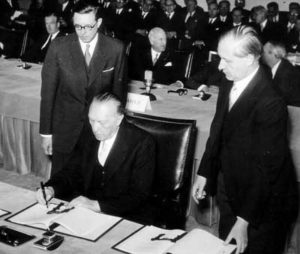 May 26: The U.S., Great Britain and France sign a separate peace treaty with the West German government in Bonn. Under the treaty, the Bonn government gains back most of its sovereignty and agrees to rearm and provide troops to serve in the newly-created NATO force. The pact formally ends seven years of Western occupation, although the U.S. and Britain promise to keep their troops in Berlin and West Germany to ensure West Germany’s protection, and to ensure France’s protection if Germany attempts to pull out of the treaty. The Soviet Union denounces the treaty as an open military alliance of the Allies and West Germany against Moscow.
May 26: The U.S., Great Britain and France sign a separate peace treaty with the West German government in Bonn. Under the treaty, the Bonn government gains back most of its sovereignty and agrees to rearm and provide troops to serve in the newly-created NATO force. The pact formally ends seven years of Western occupation, although the U.S. and Britain promise to keep their troops in Berlin and West Germany to ensure West Germany’s protection, and to ensure France’s protection if Germany attempts to pull out of the treaty. The Soviet Union denounces the treaty as an open military alliance of the Allies and West Germany against Moscow.
![]()
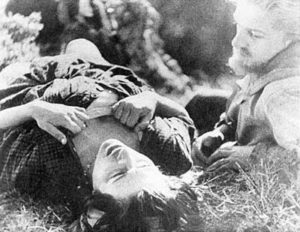 May 26: The U.S. Supreme Court rules in Joseph Burstyn, Inc. v. Wilson that the New York Education Law allowing censors to ban films deemed “sacrilegious” was an unconstitutional restraint on the freedom of speech in violation of the First Amendment. The decision, sometimes called the Miracle Decision, comes in response to a ban placed on the short Federico Fellini film The Miracle. Its plot centered on a man, “Saint Joseph”, who impregnates “Nanni,”, a disturbed peasant girl who believes she is the Virgin Mary. The short story is included with Jean Cocteau’s La voce umana as part of the larger Italian film L’Amore. L’Amore was subtitled and released in the U.S. as Ways of Love. The New York Film Critics Circle voted Ways of Love the best foreign language film of 1950. But the New York State Board of Regents examined the film and decided that it constituted religious bigotry and ordered the picture banned in the state. Although the Supreme Court says censorship can continue for obscenity, the landmark decision marks the beginning of the end for film censorship in the U.S.
May 26: The U.S. Supreme Court rules in Joseph Burstyn, Inc. v. Wilson that the New York Education Law allowing censors to ban films deemed “sacrilegious” was an unconstitutional restraint on the freedom of speech in violation of the First Amendment. The decision, sometimes called the Miracle Decision, comes in response to a ban placed on the short Federico Fellini film The Miracle. Its plot centered on a man, “Saint Joseph”, who impregnates “Nanni,”, a disturbed peasant girl who believes she is the Virgin Mary. The short story is included with Jean Cocteau’s La voce umana as part of the larger Italian film L’Amore. L’Amore was subtitled and released in the U.S. as Ways of Love. The New York Film Critics Circle voted Ways of Love the best foreign language film of 1950. But the New York State Board of Regents examined the film and decided that it constituted religious bigotry and ordered the picture banned in the state. Although the Supreme Court says censorship can continue for obscenity, the landmark decision marks the beginning of the end for film censorship in the U.S.
![]() May 27: The Soviets and East Germans retaliate against the previous day’s signing of a separate peace treaty between the U.S., Britain, France and West Germany, by cutting off telephone and telegraph services between West Berlin and the outside world. They also bar Allied patrols from the designated highways linking West Berlin to the West.
May 27: The Soviets and East Germans retaliate against the previous day’s signing of a separate peace treaty between the U.S., Britain, France and West Germany, by cutting off telephone and telegraph services between West Berlin and the outside world. They also bar Allied patrols from the designated highways linking West Berlin to the West.
![]() May 27: North Korean truce negotiators in Panmunjom threaten to renew full-scale warfare in retaliation for the so-called “massacre” of Communist POWs on Koje Island.
May 27: North Korean truce negotiators in Panmunjom threaten to renew full-scale warfare in retaliation for the so-called “massacre” of Communist POWs on Koje Island.
![]() May 28: Soviet and East German soldiers begin setting up new barricades between the Eastern and Western sectors of Berlin. They also start clearing a 386-mile-long no-man’s-land between East and West Germany. East Germany says it will begin issuing “shoot to kill” orders against anyone trying to cross the buffer zone beginning June 1. This effectively closes the border between East and West Germany, although East Germans are still able to enter the west via Berlin.
May 28: Soviet and East German soldiers begin setting up new barricades between the Eastern and Western sectors of Berlin. They also start clearing a 386-mile-long no-man’s-land between East and West Germany. East Germany says it will begin issuing “shoot to kill” orders against anyone trying to cross the buffer zone beginning June 1. This effectively closes the border between East and West Germany, although East Germans are still able to enter the west via Berlin.
![]()
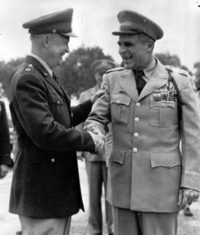 May 30: Gen. Dwight D. Eisenhower officially steps down as Supreme Commander of the newly formed allied NATO forces in Europe. Gen. Matthew B. Ridgway, until recently the supreme commander of U.N. forces in Korea and U.S. forces elsewhere in Asia, becomes the new NATO chief. Eisenhower had earlier announced his intention to step down as NATO commander, and said that if he wins the Republican presidential nomination, he will resign from the Army entirely
May 30: Gen. Dwight D. Eisenhower officially steps down as Supreme Commander of the newly formed allied NATO forces in Europe. Gen. Matthew B. Ridgway, until recently the supreme commander of U.N. forces in Korea and U.S. forces elsewhere in Asia, becomes the new NATO chief. Eisenhower had earlier announced his intention to step down as NATO commander, and said that if he wins the Republican presidential nomination, he will resign from the Army entirely
![[Emphasis Mine]](http://jimburroway.com/wp-content/uploads/2018/01/PerambulatingDandies.jpg)
